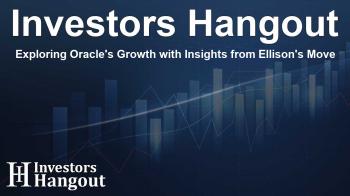Exploring Oracle's Growth with Insights from Ellison's Move

Understanding Oracle's Recent Stock Moves
Lawrence J. Ellison, the Executive Chairman at Oracle (NYSE: ORCL), recently executed a strategic move that involved acquiring stock options for a total of 571,286 shares. This acquisition showcases Ellison's confidence in the potential for growth within the company, reflecting a keen insight into market trends and the company’s direction.
What This Acquisition Means
In a recent filing with the U.S. Securities and Exchange Commission, this acquisition gives Ellison the right to purchase Oracle's stock at $280.07 per share. At the time of the announcement, Oracle shares were trading at $283.00, meaning the total worth of this move is approximately $1,673,867. This sizeable investment emphasizes the optimism surrounding Oracle’s future.
About Oracle Corporation
Founded in 1977, Oracle has established itself as a frontrunner in enterprise applications and infrastructure offerings, providing solutions that are flexible in deployment—whether on-premises, cloud-based, or hybrid. Oracle initially revolutionized the software market with its SQL-based relational database management system, which remains indispensable for the world's largest firms, especially those engaged in high-volume online transaction processing.
Growth Prospects for Oracle
Notably, Oracle has recently shown a promising financial trajectory. By August 31, 2025, the company reported a solid revenue growth rate of approximately 12.17%. While this figure shows a healthy upward trend, it is crucial to contextualize it within the competitive landscape of the Information Technology sector where Oracle's growth is below the industry average.
Financial Insights into Oracle's Performance
While looking at Oracle's financial health, several metrics present a mixed outlook. Firstly, Oracle faces challenges with its gross margin, which is recorded at 67.28%. Such a margin may concern investors, indicating potential difficulties in sustaining profitability compared to its industry peers.
Exploring Earnings Metrics
Another critical indicator is the Earnings per Share (EPS)—currently at 1.04—which lags behind industry averages. This could suggest a potential decline in overall earnings and is a point of vigilance for investors looking to understand the company's profitability trajectory.
Oracle's debt-to-equity ratio presents additional concerns, standing at a notable 4.36, surpassing typical industry standards. This level of debt could pose financial challenges, potentially affecting future strategic maneuvers and expansions.
Valuation Considerations
When discussing valuation, Oracle's Price to Earnings (P/E) ratio is pegged at 65.14, which is lower than the industry average, hinting that Oracle’s stock may be undervalued. Similarly, a Price to Sales (P/S) ratio of 13.73 also points towards an undervaluation based on sales performance, a noteworthy observation in the current market climate.
Market Capitalization and Recognition
On a more positive note, Oracle boasts a market capitalization that stands above the industry average—a clear indication of its size and strong market presence. This level of market recognition can be crucial for attracting investment and talent in the competitive tech sphere.
The Role of Insider Transactions
Transactions made by insiders like Ellison provide valuable insights into corporate confidence and future projections. In general, when insiders purchase stock, it often signals their belief that the company is on the verge of experiencing significant growth. However, it is important to understand that not all insider sales reflect a negative outlook; they can stem from personal situations unrelated to the company's performance.
Understanding Transaction Codes
Investors often pay attention to transaction codes on forms like Form 4, which indicate the nature of stock activity. A P indicates a purchase, while a S denotes a sale. Understanding these codes helps investors gauge insider sentiment and can provide context for strategic decisions.
Frequently Asked Questions
What does a significant insider purchase signal?
A significant insider purchase often indicates confidence in the company's future and expectations for stock appreciation.
How does Oracle's debt influence its operations?
Oracle's debt can impact its financial flexibility, affecting investments and growth strategies.
What is Oracle's current market trend?
As of the latest data, Oracle's shares are trading slightly above the acquisition price set by Ellison, reflecting a steady market performance.
How is Oracle positioned within the tech industry?
Oracle maintains a prominent position in the tech industry, particularly in database and enterprise application services, although it faces stiff competition.
Why is insider buying important in stock analysis?
Insider buying can be a pivotal factor for investors as it may indicate a belief in the company’s growth potential and investor confidence.
About The Author
Contact Addison Perry privately here. Or send an email with ATTN: Addison Perry as the subject to contact@investorshangout.com.
About Investors Hangout
Investors Hangout is a leading online stock forum for financial discussion and learning, offering a wide range of free tools and resources. It draws in traders of all levels, who exchange market knowledge, investigate trading tactics, and keep an eye on industry developments in real time. Featuring financial articles, stock message boards, quotes, charts, company profiles, and live news updates. Through cooperative learning and a wealth of informational resources, it helps users from novices creating their first portfolios to experts honing their techniques. Join Investors Hangout today: https://investorshangout.com/
The content of this article is based on factual, publicly available information and does not represent legal, financial, or investment advice. Investors Hangout does not offer financial advice, and the author is not a licensed financial advisor. Consult a qualified advisor before making any financial or investment decisions based on this article. This article should not be considered advice to purchase, sell, or hold any securities or other investments. If any of the material provided here is inaccurate, please contact us for corrections.

